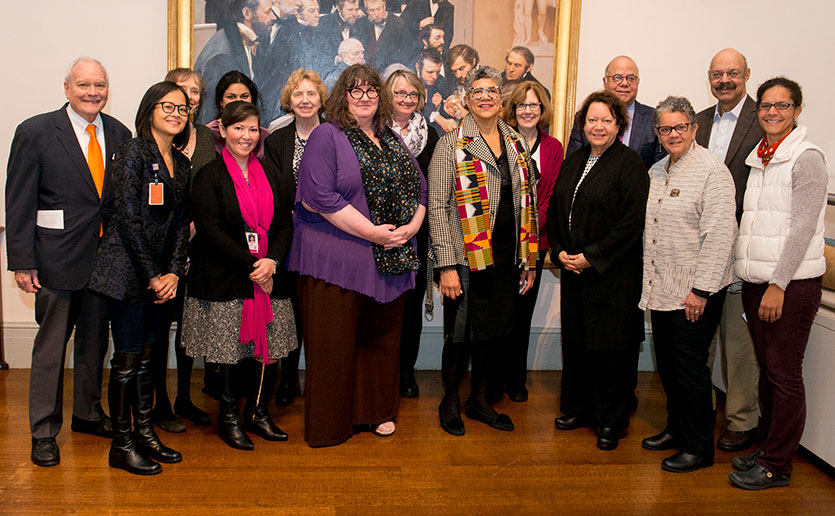Nhi-Ha Trinh, MD, MPH, director, Psychiatry Center for Diversity at Massachusetts General Hospital, describes the center’s work to advance anti-racism through diversity, equity, inclusion (DEI) within the psychiatry department, throughout the hospital, and across the Mass General Brigham system.
What’s the role of the Psychiatry Center for Diversity at Mass General?
Our role is to improve care for patients of diverse backgrounds and make the workplace more representative and inclusive. We partner with the hospital and the Mass General Brigham system to promote anti-racist policies. We provide speakers, trainings and other resources to help groups in the department become more inclusive. And department members, leaders and groups often reach out to us when they want input on difficult situations.
Every patient with a mental health concern already experiences a tremendous amount of stigma and discrimination.
How do the current events affect your work?
We are facing a dual pandemic with COVID-19 and ongoing racism. Both of these factors have contributed to an increased awareness of inequities. Our Psychiatry Center for Diversity used to be a small (but powerful) group, but since the uprisings of this spring, we have doubled our membership.
Everyone is thinking about this now: how to learn, how to grow, how to be a part of the change they want to see in the world. It means a lot when a chorus of individuals speak up on behalf of other groups advocating for our shared humanity. These voices will ultimately change our world.
How does your work help people with mental health challenges?
Every patient with a mental health concern already experiences a tremendous amount of stigma and discrimination. On top of that, many may have a lifetime of being discriminated against because of some aspect of their personal identity or background, which then can impact and complicate mental health issues.
People’s difficult life experiences can make them at risk for depression, anxiety, and substance use disorders. By providing clinician and staff training, we encourage people to think more critically about the care they provide and how they interact with patients and their colleagues.

What’s your personal connection to this work?
We each have our own personal lifelong journey regarding these topics. The way I think about issues of DEI and anti-racism today is very different from how I felt even a month ago. I’m committed to reading, discussing, and learning from others. I honestly believe that changing just one person’s behaviors can have a ripple effect — in caring for patients or interacting with colleagues or others in the community. I’m currently focusing on how to combine three strains of thought: cultural humility, anti-racism and trauma-informed care. Discrimination and racism are forms of lifelong trauma, and I’m developing ways to train clinicians to care for patients using these frameworks.
Tell me about Diversity Dialogues.
Diversity Dialogues bring members of a group together to get to know each other in a deeper, more personal way, with the goal of exploring the challenges of working in a group with diverse perspectives. Anne Emmerich leads these groups; she often asks people to bring an object of personal meaning to share with the group. The process of story-telling using a meaningful object helps people share of themselves in a deeper way than they do on a day-to-day basis.
What are microaggressions, and how can we stop them?
The late Chester Pierce, MD, a giant in our field and a valued leader in our department, coined this term. Microaggressions are everyday slights that often leave the recipient confused about the impact, the meaning, or even the intent of a comment.
Philanthropy is what makes it possible for our faculty to share our messages more broadly.
Most of the time, people are taken aback (“Did that just happen?”) and find themselves at a loss for words. Sometimes microaggressions can appear to be very positive “compliments,” but they still reinforce some biases that people might have.
For example, young female physicians sometimes hear, “you’re too pretty or too young to be a doctor,” leaving them to think that they are not experienced or skilled enough, and over time, those messages can lead them to doubt themselves. The harm is not the intention, which may be good, but rather the impact, which is deleterious.
In partnership with our psychiatry residency program, we are involved in workshops to empower faculty in the psychiatry residency program to intervene in the moment, when trainees are subjected to biased comments by patients, their families or health care staff.
How does philanthropy help the center?
One of our challenges is that this work may feel fundamental, full of great common sense, and “the right thing to do.” At the same time, it takes significant “person power” to run workshops that encourage and educate, support department groups in their anti-racist and DEI work, and engage the department in an anti-racist strategy. Philanthropy is what makes it possible for our faculty to share our messages more broadly.
To support the Mass General Psychiatry Center for Diversity, please contact us.




